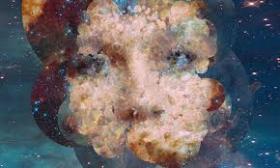We are stardust
Billion year old carbon
We are golden
Caught in the devil’s bargain
And we’ve got to get ourselves
Back to the garden
~Joni Mitchell
Michelle Thaller: “How can you sum up human existence? It turns out it’s really pretty simple.
We are dead stars looking back up at the sky. Everything you are, literally the iron in your blood, comes from the instant before a star dies. You cut yourself and you see that red from oxygenate hemoglobin and that was the instant of the death of a solar system. 
The universe began with only the element hydrogen, the very simplest atom that exists. The only thing in the universe that can make a bigger atom is a star. The entire periodic table, every element that you’ve ever heard of was processed inside the body of a star. That star then unraveled or exploded and here we are.
All a star is, is a dust cloud that was collapsing under the force of gravity – that’s it. When you compress gas together it actually heats up. There’s a time when it’s hot enough to set off a nuclear fusion reaction and that actually supports the star, that this nuclear explosion inside supports the star against further collapse. But that nuclear fusion reaction is using fuel – fusion hydrogen. And so, eventually that will burn out and the collapse of gravity will keep going.
In the case of a more massive star the gravity crushes ever more and more tightly, things get hotter inside to create things like carbon, oxygen and nitrogen and so finally you get to the element iron. Fuse iron together and instead of energy coming out, energy actually absorbs and the core of the star collapses. And that sets off the most violent brilliant supernova reaction. Everything outside the element of iron, everything heavier – all the gold, silver, lead, uranium – that’s formed in that supernova explosion. 
A single star will glow as whitely as an entire galaxy that has hundreds of billions of stars, in that moment of death. And that’s what you are, is that the minimum your body is – is that instant of death.
For tens of thousands of years humans thought of stars as eternal. The stars will all burn out someday. There’s only a certain amount of star fuel – hydrogen. The stars are burning through it. And, that the stars as we know them will all die out in trillions of years and the universe will be dark for the rest of time – whatever that means.
But think about that. We’re actually living in an Eden right now. We’re living in a time when this ten billion years lifespan, the sun, is pouring down free energy. We’re using it, we are surviving, we are sentient, and we are looking out at the universe. And, what an amazing thing to think about, that only for a tiny brief part of the universe’s history and everything else will eventually be dark.
It does gives an ownership about how wonder this time is, how wonderful your life is right now, you’re literal life but also how wonderful this time in the universe is. And someday I wonder if people will have myths about the days when stars rained down sunlight and free energy.” 
~Michelle Thaller is an American astronomer, research scientist and astrophysicist. She is currently the assistant director for Science Communication at NASA’s Goddard Space Flight Center.



Star Children
When a star explodes, it briefly shines in visible light with a brightness of 10 billion stars. Happily for us, stars don’t explode that often, about once per hundred yeas per galaxy. But we are lucky that they do, because if they didn’t, we wouldn’t be here. One of the most poetic facts I know about the universe is that essentially every atom in your body was once inside a star that exploded. Moreover, the atoms in your left hand probably come from a different star than did your right We are all literally star children and our bodies made of stardust.
(from A Universe from Nothing by Lawrence M. Krauss
Struggle to wake up the world from its long nightmare of belief
This is someone, Dover, who I probably should have known about, yet did not. Although, it is true that I rarely read pieces by people with whom I share a similar philosophy, in part, because much of what I read today is part and parcel of my ‘thinking’ in my 20’s back in the 1970’s. Back then atheists were muted, and the term nonbeliever or unbeliever was not in general use. In the scheme of ‘our’ way of thinking and understanding, nonbeliever is topline.
However, Lawrence Krauss, who is 5 years younger than me, has a stellar, as it were, background, whereas I am merely a philosophical laymen, but nevertheless, a lifelong philosopher.
Even with a cursory Google of him, Professor Krauss, on the other hand, just bowls me over. His background is far and away the one-man embodiment of a stellar cast. I will endeavor to read more about him and his associates as the few contemporary nonbelievers “struggle to wake up the world from its long nightmare of religious belief.”